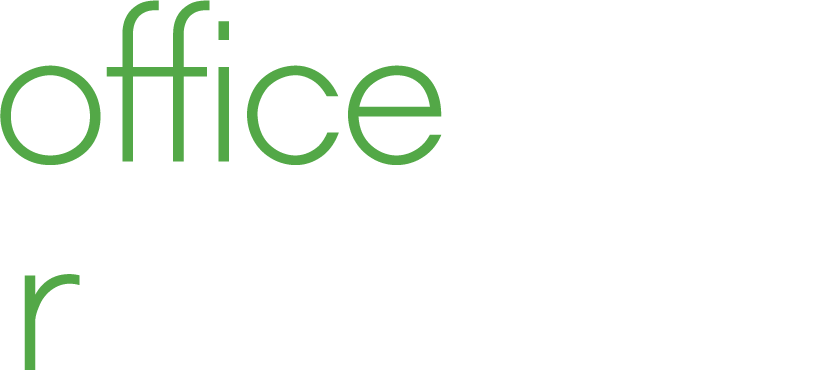Embracing Neurodiversity: Paving the Way for Inclusive Workplaces
In an era where diversity and inclusion are pivotal to organizational success, embracing neurodiversity has emerged as a key aspect of creating truly inclusive workplaces. Neurodiversity refers to the natural diversity of human brains and brain functions, encompassing a range of variations related to learning, thinking differences, neurodevelopmental conditions, mental health, and unique brain functions and behavioral patterns.
Understanding, accommodating, and leveraging these differences are not only ethical imperatives but also strategic advantages for organizations, as diverse teams are known to be more creative, innovative and productive.
This blog post aims to shed light on what neurodiversity means, its importance in the workplace, and how employers can create physical environments that support neurodivergent employees.
What is Neurodiversity?
Neurodiversity encompasses a range of neurological variations, including Autism Spectrum Disorder (ASD), Attention Deficit Hyperactivity Disorder (ADHD), Dyslexia, and other neurodevelopmental conditions. Instead of framing these variations as shortcomings, the neurodiversity perspective regards them as distinct differences that enrich the workplace. It highlights that every person’s neurological configuration, or neurotype, introduces unique advantages and challenges, fostering a workplace environment ripe with diverse viewpoints that can spearhead innovation and enhance problem-solving processes.
Why Neurodiversity Matters in the Workplace
The importance of recognizing and integrating neurodiversity into workplace cultures is critically important. Neurodivergent individuals, who make up 15%-20% of the global population, bring a wealth of diverse skills and perspectives to the workforce. Yet, they encounter significant employment challenges, highlighted by the fact that approximately 85% of college-educated autistic individuals are unable to secure employment. This gap not only deprives these individuals of opportunities to contribute and thrive but also results in a substantial loss for organizations that overlook the value of neurodiverse talents.
Barriers such as misconceptions, biases, and insufficient accommodations in the workplace further exacerbate this issue. These obstacles not only impact the lives of neurodivergent individuals but also prevent businesses from realizing the full advantages of neurodiverse teams. Such teams are often marked by enhanced engagement, increased productivity, and reduced staff turnover. Addressing these barriers and fostering an inclusive work environment is essential for tapping into the potential that neurodiversity offers to the modern workplace.
Creating Physical Workplaces That Support Neurodivergent Employees
The physical and sensory environment of the workplace plays a critical role in supporting or hindering neurodivergent employees. Creating neuroinclusive environments involves more than just physical adjustments; it encompasses a holistic approach that includes psychological, emotional and cognitive considerations.
By designing spaces that cater to a variety of sensory needs and work styles, organizations can enhance focus, comfort, and productivity for all employees. This includes offering quiet zones for deep concentration, collaborative spaces for team interactions, adjustable lighting, and ergonomic furniture that accommodates different physical needs.
Here are some strategies, accommodations and practical steps employers can implement to create supportive neuroinclusive environments:

Inclusive Recruitment and Onboarding:
Adapting hiring practices to be more inclusive, such as offering alternative interview formats or clearly stating the support available for neurodivergent applicants. Onboarding processes should also be designed to accommodate diverse learning styles and provide clear, accessible information.
To right: Elevate Longfellow


Awareness and Training:
Educating staff and management about neurodiversity to foster understanding and empathy. This includes training on the strengths and challenges associated with different neurotypes and how to support colleagues effectively.
To left: McDonalds HQ
Support and Resources:
Providing access to mentorship, support groups, or resources specifically for neurodivergent employees can aid in their professional development and sense of belonging.
To right: Clark Nexsen
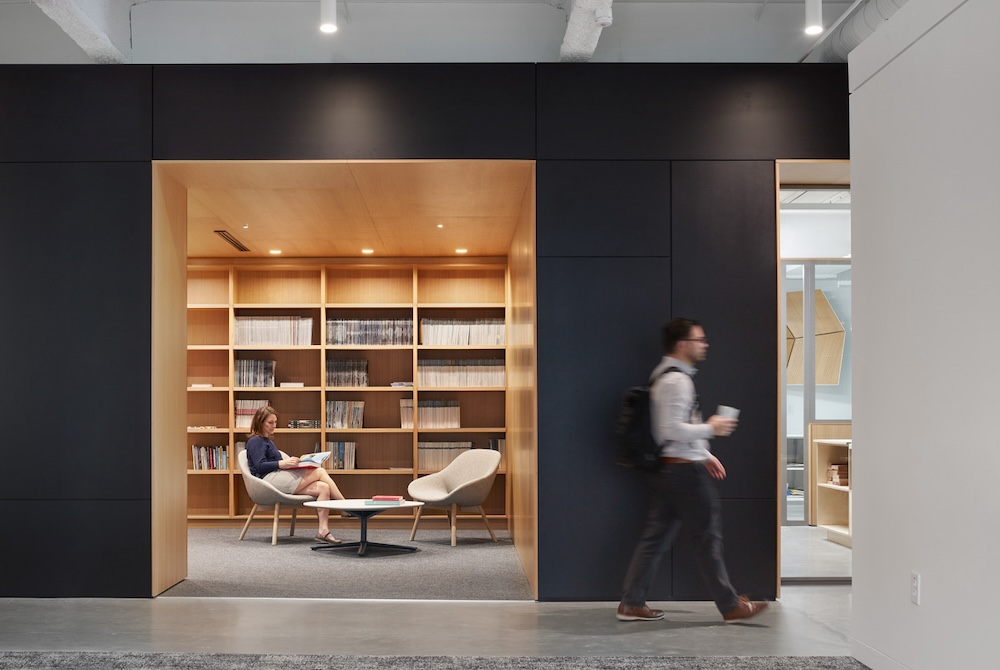
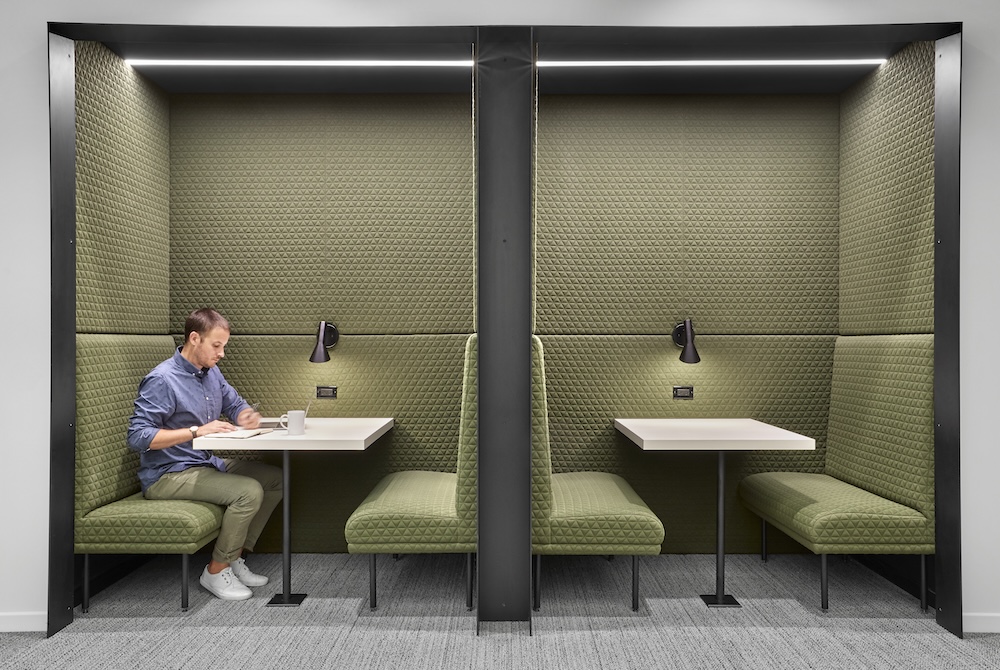
Flexible and Varied Workspaces:
Provide a variety of workspaces that cater to different needs and preferences. This includes quiet areas for those who need a low-stimulus environment, collaborative spaces for teamwork, private booths for phone calls or focused work, and comfortable lounging areas for breaks.
To left: McDonalds HQ
Ergonomic Furniture and Accessibility:
Invest in ergonomic furniture that supports various body types and work styles. Adjustable desks, supportive chairs, and accessible design elements ensure that the workplace accommodates physical needs and promotes comfort and well-being for everyone.
To right: Narrative Science
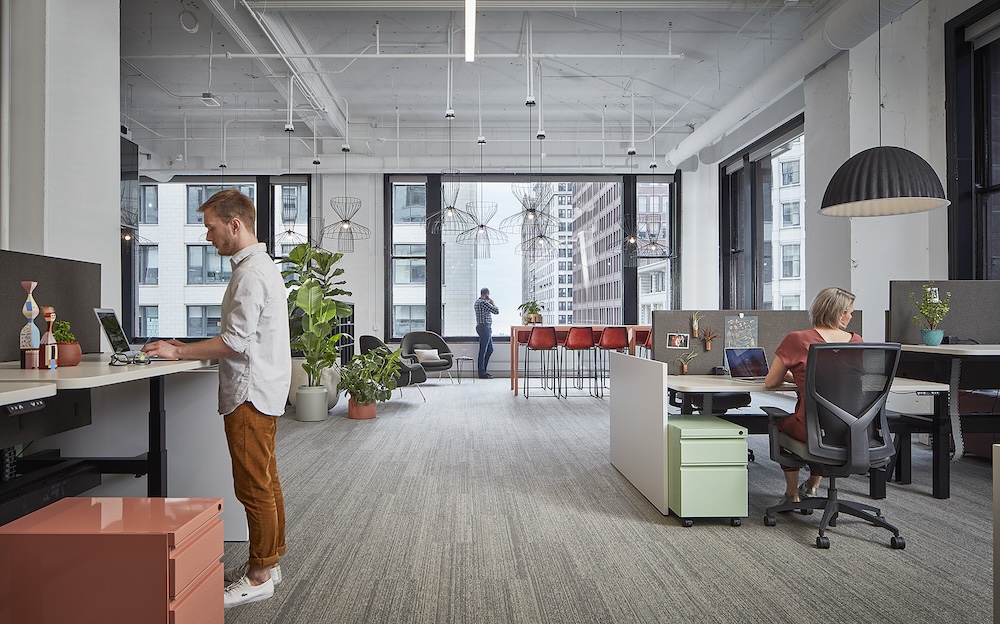
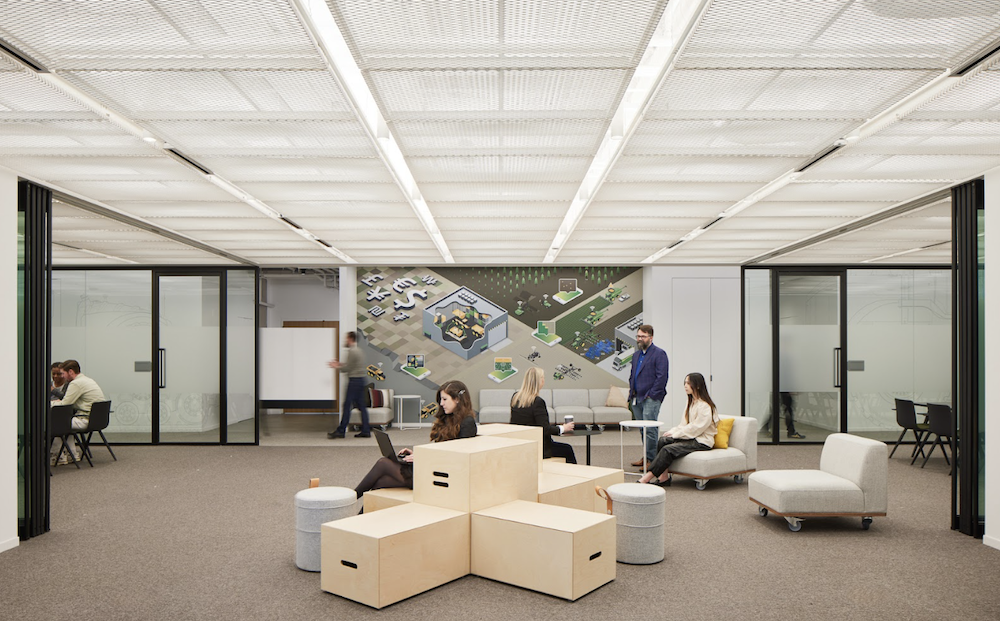
Customizable Workspaces:
Allowing employees to personalize their workspaces with equipment that supports their needs, such as noise-canceling headphones, standing desks, or visual aids, can make a significant difference in their productivity and comfort.
To left: John Deere HQ
Sensory-Friendly Design:
Adjust lighting, acoustics, and color schemes to create a sensory-friendly environment. Options such as natural lighting, soundproofing materials, and the use of calming colors can make a significant difference. Offering personal control over lighting and noise levels, where possible, allows employees to tailor their immediate environment to their needs.
To right: Jet Support Services
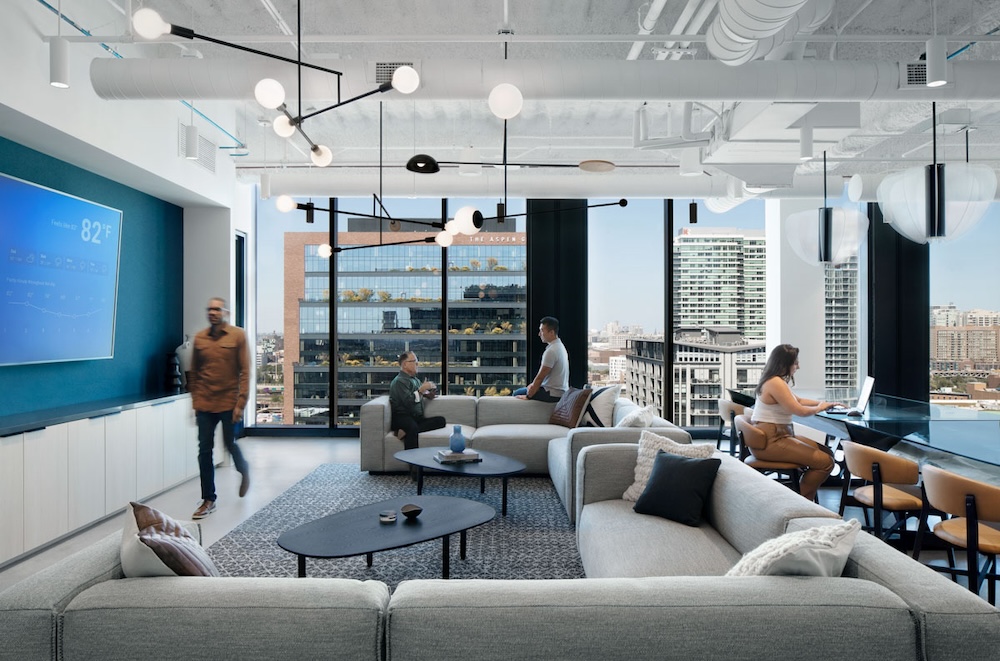
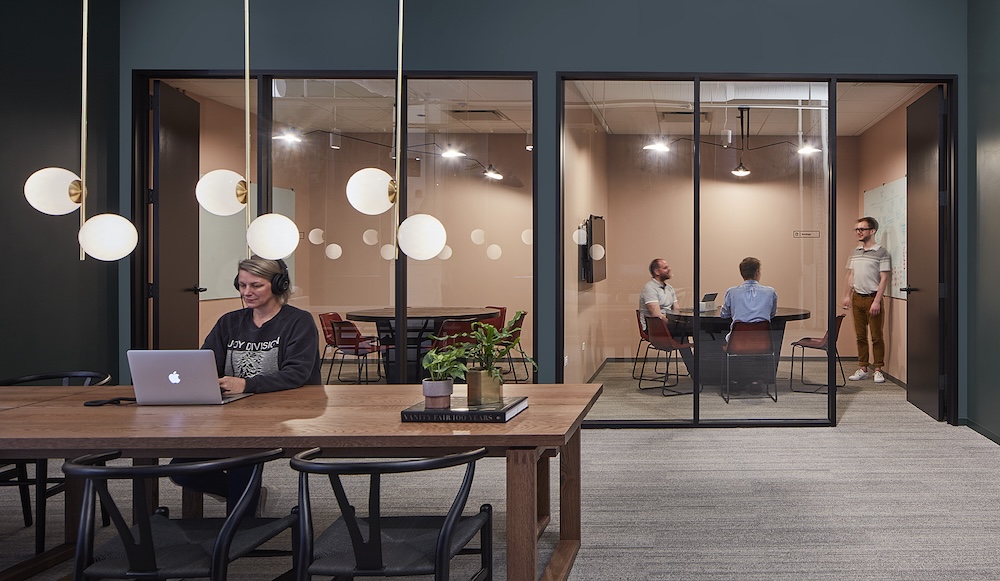
Technology and Tools:
Providing access to technology and tools that support diverse work styles is crucial. This includes speech-to-text software for those with dyslexia, time management apps for individuals with ADHD, and noise-cancelling headphones for those sensitive to auditory distractions.
To left: Narrative Science
Biophilic Elements:
Incorporate natural elements into the workplace design. Plants, water features, and views of nature not only enhance aesthetic appeal but also have been shown to reduce stress and improve mood and cognitive function, benefiting all employees but particularly those who are neurodivergent.
To right: McDonalds HQ
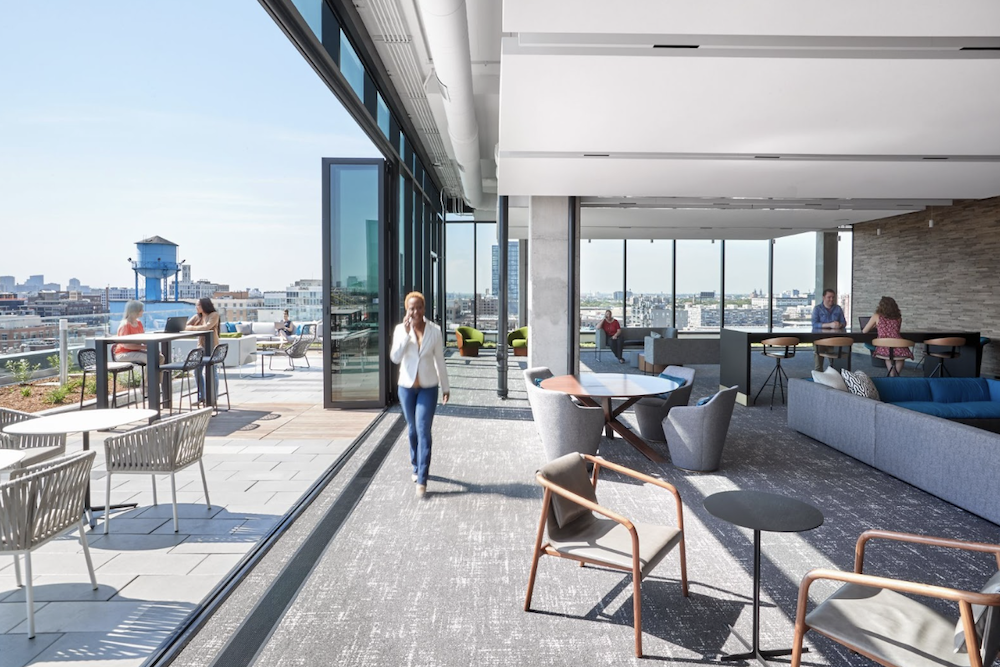

Visual Aids and Signage: Use clear, concise signage and visual aids throughout the office to make navigation and understanding workplace protocols easier for everyone, especially for those with cognitive differences.
To left: Confidential Technology Client
Creating a neuroinclusive workplace is not just about making accommodations but about recognizing and valuing the diverse perspectives neurodivergent individuals bring. It requires a shift in mindset from seeing neurodivergent traits as challenges to be managed, to viewing them as unique strengths that can contribute to the organization’s success. Employers who embrace this shift stand to benefit from a more innovative, resilient, and inclusive workforce.
The journey towards embracing neurodiversity and creating neuroinclusive workplaces is ongoing and requires commitment, creativity, and a willingness to adapt. By understanding what neurodiversity is and its significance, employers can take meaningful steps to accommodate the diverse needs of their workforce. Implementing thoughtful design and providing supportive accommodations are key to unlocking the potential of neurodivergent employees.
As businesses continue to embrace these practices, they not only enhance the work experience for neurodivergent individuals but also enrich their teams with a broader range of perspectives, driving innovation and inclusivity forward. In doing so, they set a new standard for what it means to be a truly inclusive and diverse workplace.

Kelly Colón is an inspirational leader and the driving force behind Eledex Consulting, LLC. A unique consultancy dedicated to supporting individuals, families, organizations and institutions in their journey towards embracing and actualizing cognitive diversity as well as understanding organizational & occupational behavior.
As an accomplished consultant, neurodivergent coach, professor, author, speaker and advocate, Kelly’s multifaceted career is rooted in a deep personal commitment to ensuring all diversity; including cognitive diversity is not merely accepted but celebrated in our workplaces, our classrooms and in society.

